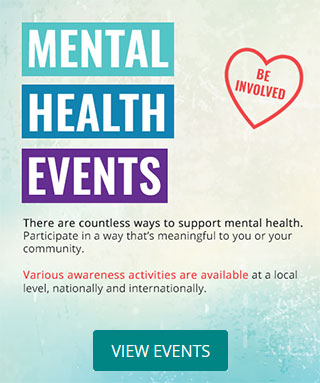Statewide Mental Illness Learning Exchange
Management of physical health

In this section we begin to look at how physical health can impact our mental well-being and which physical activities help to support our mental health. We also list some valuable resources.
in this Section
01. Mental health and oral care concerns
03. How pets can assist with our mental health
Interdependent relationship between body and mind
Mind-body and well-being are intimately related, such that both have positive and negative feedback effects on well-being. The direct adverse impacts of mental illness on physical well-being is less evident than the converse, however there can be significant physical adverse outcomes resulting from mental illness.
Management of physical health
Frequently asked questions (FAQs)
How can mental health impact on physical well-being?
- Depressive and anxiety disorders vary in intensity and duration. In their most virulent expression, they can threaten the survival of the individual. A severely depressed person may have a sense of futility and worthlessness to the extent that they feel life is intolerable. If they don’t seek urgent help, they may attempt an act of self-harm or suicide. Similarly, with certain expressions of anxiety, as in anorexia nervosa (extreme eating disorder resulting in progressive starvation), the sufferer may put their physical well-being or even their life at risk, without any conscious consideration of self-harm.
- Metabolic syndrome, defined as a cluster of disorders – including high blood pressure, central obesity, high cholesterol and impaired glucose tolerance/diabetes is caused by insulin resistance and has a higher prevalence in people with mental illness, particularly in the schizophrenia group. The cornerstone of metabolic syndrome management is weight loss, particularly through diet and exercise, along with reduction in the other cardiovascular risk factors: smoking, diabetes, hypertension and high cholesterol: https://www.healthdirect.gov.au/metabolic-syndrome
- Substance dependence has effects on both physical and mental well-being. Direct effects of dependent and excessive alcohol and drug consumption include, liver damage, cirrhosis and failure; insult to the body’s clotting mechanisms (coagulopathy) and associated bleeding; varicose veins in the gullet (oesophageal varices) and associated bleeding; hearts damage; stomach ulcers and susceptibility to metabolic brain injury. Both mental and physical states may deteriorate concomitantly. In addition, vulnerability to infections if needle-sharing is well-known, and intravenous drug users are susceptible to HIV, hepatitis C or B, and secondary infections from immune system weakness such as viral or bacterial respiratory illness or fungal problems.
On the other hand, studies linking activities, which calm the mind such as calming music, mindful exercise (e.g. yoga) and relaxation techniques including meditation, have shown improved immune function. It is suggested that this could result in improved immuno-protection with better outcomes in infections, autoimmune disorders and cancer.
Which physical attributes might impact mental health?
- Eating well, with a diet rich in essential nutrients including vitamins and micronutrients, will result in improved energy levels and motivation.
- Regular exercise is arguably the single-most useful activity one can undertake to naturally improve one’s physical and mental well-being. This is particularly true for long-term, chronic medical condition. Undertaking regular physical activity, ideally at least 20 minutes three times a week, will also improve energy levels and work capacity, resulting in an improved sense of well-being. Depending on co-existing medical problems exercise capacity may be severely restricted, but in nearly all instances can be undertaken in some form or another.
Similar mental health outcomes for chronic severe lung disease such as asthma or emphysema often caused by or aggravated by cigarette smoking. People experiencing mental illness start smoking at an earlier age, smoke more and are more dependent. Nicotine replacement therapy (NRT) and psychosocial interventions have been shown to help people stop smoking.
- Sleep is an essential physiological function, and adequate sleep (generally 8 hours for adults to 60 years) is required for optimal well-being. Disrupted sleep leads to irritability, poor decision-making, and may adversely impact on activities requiring prolonged concentration such as driving vehicles, handling machinery or responsible positions at work. Significant sleep deprivation will result in development of agitation, irritability, anxiety and in its more extreme expression, psychosis. More commonly however, acute and severe anxiety usually results in sleep disturbance.
Depression is usually associated with sleep problems: sufferers generally have difficulty getting to sleep, or wake early and can’t get back to sleep. Management of disordered sleep is to treat the cause, and may be quite complex and difficult: Read more
- On-going chronic pain, such as musculoskeletal (joint or muscle pain), neuralgia, migraine, pelvic, motor or work accident etc., is a major drain on one’s defenses and is a major concern for mental health well-being. If untreated or under-managed, it can lead to depression, anxiety, inability to cope, loss of self-esteem, retreat from social interaction and the consumption of on-going medication, some of which may lead to subsequent addiction. Consequent to pain management strategies, drug-seeking behaviour may result in a downward spiral resulting in personality changes, further loss of self-esteem, job unreliability or unemployment and alienation from family and friends.
- Heart conditions may cause mental anguish both directly from conditions such as abnormal cardiac rhythms (electrical faults in the heart), which may give unsavoury feelings in the chest and cause anxiety, sometimes associated with a sense of impending doom. Following coronary artery disease, heart attack and heart failure, depression may occur as a post-surgical response, or because of loss of functional life capacity and general fatigue due to cardiac dysfunction once the heart muscle has been permanently damaged. Management may be a combination of treating the condition and treating the resultant mood changes along with family and community support.
- Brain syndromes following trauma or acquired, for example stroke, dementia or brain tumours, frequently have associated disordered cognitive or mental health function. They can be associated with personality and mood changes, anxiety, disordered thinking or confusion, and may or may not improve with medical management.
- Drugs and alcohol may cause or be a result of mental illness. Compounding worsening effects on people who already suffer from mental illness include impaired ability to problem solve, aggravation of anxiety, depression and psychosis. These effects may be temporary or permanent, such as resultant brain damage and dementia with long-term alcohol consumption, crystal methamphetamine (ice) or cannabis. With persistent and dependent use, the sufferer’s life revolves around the need for acquiring more drugs. This may then result in poor lifestyle choices, irritability, mood changes, anxiety, paranoia, depression and psychotic thinking in vulnerable individuals.
- Obesity, of epidemic proportions in our society, may result in diabetes and high blood pressure (hypertension), both of which may further lead to heart disease. In its extreme, obesity reduces one’s capacity for physical exertion, with resultant less activity, potentially fewer outings and social isolation.
- Hormonal imbalance can be the underlying cause of mental health problems. For instance, under active thyroid gland can present as loss of energy, weakness and depressed mood, whilst an overactive thyroid may similarly cause fatigue, tremor and anxiety.
- Excessively high or low sugar levels in diabetes may cause confusion, which may be mistaken as anxiety or psychosis. Diabetes is also associated with a higher prevalence of depression: https://www.diabetesaustralia.com.au/depression-and-mental-health
- Loss of ovarian function from menopause or surgery, without hormone replacement may cause flushes, sweats, anxiety, and abide mood swings. These hormonal imbalances are largely correctable and generally result in improvement and stabilisation of mental health dysfunction.
- Pre-terminal cancer is a challenging circumstance for anyone to experience. Understandably, it may well lead to worsening depression, but this is not inevitably the outcome. Cancers, with their existential threat may cause a sense of despair, depression, anxiety, futility and worthlessness. Best medical management of the cancer inclusive of family, other support, counseling and psychotropic medication may all be needed in these generally difficult circumstances.
As can be seen from the above outlined common medical and mental health problems, there is often an intimate inter-connectivity between physical and mental health well-being. It goes without saying, that both these domains of human health should receive attention proportionately and simultaneously according to need.
Are community support groups available?
Resources
Website resources
- Better Health website on wellbeing: www.betterhealth.vic.gov.au
- BeyondBlue: Sleep, exercise and healthy eating www.beyondblue.org.au
- Department of Health: Physical Activity: www1.health.gov.au
- Diabetes Australia: Depression and mental health www.diabetesaustralia.com.au
- Head to Health: physical health www.headtohealth.gov.au
- Health Direct: Mental health and wellbeing www.healthdirect.gov.au
- RANZCP – Your Health in Mind www.yourhealthinmind.org
- SANE Australia: Mental illness & physical health www.sane.org.au
- SANE Australia: Mental illness & physical health www.sane.org.au
- The Heart Foundation: www.heartfoundation.org.au
With special thanks to
Many people have contributed to the development of this project through research, focus groups, advice, information and ideas. We would like to acknowledge and thank all who have contributed and supported us in our endeavor. They are:
Newsletters
Stay in the loop with our monthly newsletters!
If you are having thoughts of suicide, or severe self-harm please follow your crisis plan. If you do not have a crisis plan please call your treating clinician, therapist, general practitioner, one of the numbers listed below or go to the Emergency Department of the nearest hospital. In a life-threatening emergency ring 000.
Phone numbers and other supports that can be contacted in a crisis:
Life Line: 13 11 14 | www.lifeline.org.au
Sane Helpline: 1800 187 263 | www.sane.org






 The 2014 Act came into effect in July 2014. It introduced new principles to support people experiencing mental illness to make and participate in treatment decision (shared decision making) and to have their views and preferences considered and respected.
The 2014 Act came into effect in July 2014. It introduced new principles to support people experiencing mental illness to make and participate in treatment decision (shared decision making) and to have their views and preferences considered and respected.
